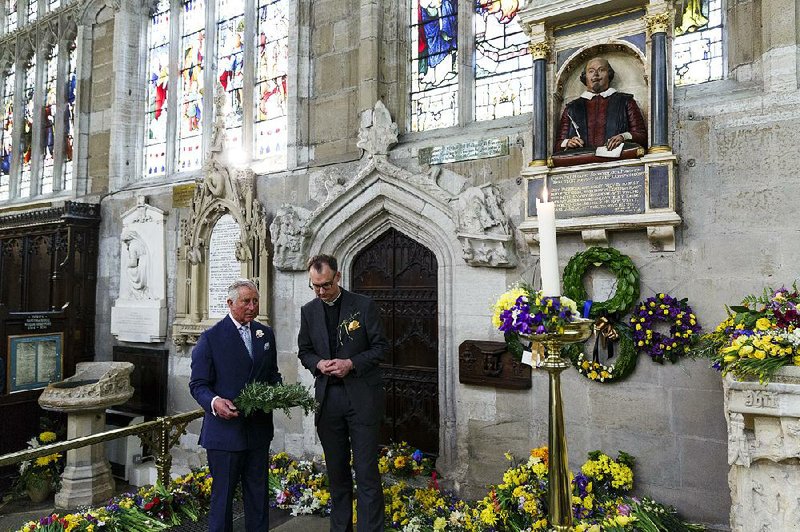LONDON -- The United Kingdom commemorated the 400th anniversary of the death of William Shakespeare on Saturday with parades, church services and stage performances. In Spain, similar celebrations marked the 400th anniversary of the death of its best-known writer, Miguel de Cervantes.
Shakespeare died April 23, 1616, but remains one of the world's most renowned writers, living on as one of Britain's leading cultural ambassadors.
President Barack Obama took a break from political talks in London to tour Shakespeare's Globe Theatre on Saturday, listening to Hamlet's "To be or not to be" soliloquy and admiring the open-air venue -- a re-creation of the theater, built in 1599, where many of the Bard's plays were first performed.
The president met a Globe troupe that has taken Hamlet on a two-year tour to almost 200 countries. They've performed Shakespeare's tragedy on a tennis court in Kabul, Afghanistan, in a Syrian refugee camp in Jordan and at the U.N. General Assembly in New York.
Dominic Dromgoole, the Globe's artistic director, said the world tour has taught him that Shakespeare "is a great aid to communication. He's a great way of helping people to encounter one another, and discover similarities and also discover differences."
"I think he has no agenda," Dromgoole said. "There's no particular drive within his work to say, this has to be worshipped or this has to be believed. He presents life, and he presents life with wit and brilliance and enchantment -- but it's life. And everybody understands life."
The Globe has also erected screens along the River Thames this weekend, showing short films of excerpts from all 37 of Shakespeare's plays, filmed in the locations where they were set: King Lear at the White Cliffs of Dover, The Merchant of Venice in the canal-crossed Italian city; Timon of Athens in front of the Parthenon.
In the playwright's home town of Stratford-upon-Avon, the Royal Shakespeare Company mounted a stage extravaganza Saturday with performances by stars including Judi Dench, Benedict Cumberbatch, Ian McKellen -- and even Prince Charles, who is scheduled to make a brief appearance as a performer in the televised show.
Earlier, Charles laid a wreath on the writer's grave in Stratford's Holy Trinity church. And thousands of people -- many wearing Shakespeare face masks -- watched a theatrical parade through the town 100 miles northwest of London, complete with schoolchildren, strolling actors and a New Orleans jazz band.
Spaniards on Saturday celebrated de Cervantes, the author of Don Quixote, a piece generally regarded as the precursor of the modern novel.
In Alcala de Henares, Cervantes' birthplace, King Felipe VI honored Mexican author Fernando del Paso with the Cervantes Prize, and Spain's Culture Minister Inigo Mendez highlighted del Paso's "contribution to the development of the novel, combining tradition and modernity, as Cervantes did."
The Cervantes award is handed out each year on April 23. It coincides with UNESCO's World Book Day, which promotes literature and commemorates Cervantes and Shakespeare.
Cervantes actually died April 22, 1616, but Spain commemorates his death on the date he was buried.
Some artists and academics have been critical of Spain's central government for not allocating funds to organize events on a scale similar to those celebrating Shakespeare's life in Britain.
Yet many still found imaginative ways to honor Cervantes. Computer expert Diego Buendia designed a program that uploaded the entire text of Don Quixote onto Twitter in blocks of 140 characters at a time over the last 17 months. And a popular TV cookery show asked competitors to produce menus linked to the region of La Mancha where Don Quixote is set.
A fusion of fantasy and reality, the book narrates the journeys and adventures by its hero and his mule-straddling squire, Sancho Panza.
Alonso Quijano is an unremarkable gentleman who, after immersing himself in numerous books about adventurous knights, decides to become one himself. Taking the name Don Quixote de La Mancha, he mounts his nag Rocinante and ventures out from a nameless village in the heart of Spain to right the wrongs of the world and defend the oppressed.
He is clearly mad and mistakes inns for enchanted castles, peasant girls for stunning princesses and confuses windmills with malevolent giants. Sancho knows his master's judgment is unsound, but he sticks by him.
The book has been a best-seller in many languages since it was first published in December 1604. Cervantes' descriptions convey many elements of Spain that readers still recognize, including some regional recipes that have come down the centuries almost unchanged.
A man of no formal schooling, Cervantes was 58 when Don Quixote was published.
Cervantes' life was nomadic and difficult. He took part in the brutal naval battle of Lepanto that left him with a shattered left arm. Then he spent five years as a hostage in Algeria from where the Barefoot Trinitarians nuns in Madrid rescued him by paying his ransom.
An archaeological excavation in 2014 found what experts concluded were Cervantes' bones buried in their convent.
Information for this article was contributed by Jill Lawless and Harold Heckle of The Associated Press.
A Section on 04/24/2016

